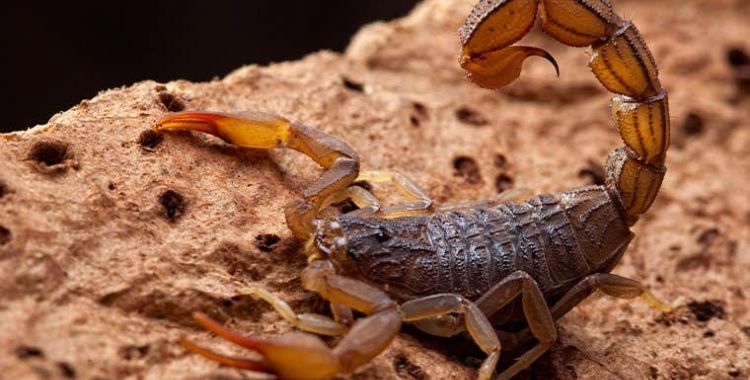
Scorpion Identification
Scorpion Identification
Scorpions
What are scorpions?
Like spiders, scorpions are arachnids. These arachnids are predators, which means they feed on other living things. Their primary food sources are insects, spiders, and other scorpions.
Scorpions have two body parts, eight legs, and lack antennae and wings. They have a set of claws and a segmented tail with a barbed stinger at the tip. They use their stinger to paralyze their prey and as a means of defense.
The two main scorpion species we commonly deal with in the Tucson area are the Arizona bark scorpion and giant hairy scorpion.
The Arizona bark scorpion is a small species, and its tail and claws are more slender than other species. The body is a brownish-yellow or tan color.
The giant hairy scorpion is a large scorpion species. They have a yellow body with darker markings on the back, and fine brown hairs cover the body and tail.

Are scorpions dangerous?
Keeping your distance and avoiding contact with scorpions is always important. While most scorpions do not deliver life-threatening stings, they can produce symptoms that require medical attention.
When scorpions deliver a sting, they inject venom into their target. Some species have very potent venom, while others possess venom that is not a massive threat to people.
The Arizona bark scorpion is the species of scorpion living in the United States that we need to be most concerned with. They have venom that can produce serious side effects that in some people can be life-threatening.
Why do I have a scorpion problem?
While the desert conditions found in our region attract scorpions, these pests actually have high moisture needs. Their need for water is what often attracts these pests to our properties. Things like damp mulch or other debris, leaking pipes, dribbling hoses, and dripping air conditioners will provide the moisture these pests need for survival.
Along with water, our properties also often provide scorpions with an endless source of food. Our yards, gardens, trees, and trash cans attract a lot of insect activity, insects that scorpions will happily feed on. When their prey moves inside our homes, usually seeking food and shelter from our area’s extreme temperatures, scorpions will follow them!
Where will I find scorpions?
When scorpions are inside your house, they retreat to dark, damp areas and areas where their insect prey tends to gather. Some of their favorite indoor gathering spots include basements, bathrooms, wall voids, under sinks, and behind sinks and tubs. Other common hiding spots on our Arizona properties include garages, sheds, potting sheds, and pool houses.
Some spots outside of our homes where scorpions regularly hang out include:
- Behind tree bark
- Under fallen trees or landscaping ties
- Under piles of leaves, grass, or mulch
- Within flower beds
- Under decks
How do I get rid of scorpions?
Scorpions thrive in our area of the country, making preventing problems with these pests difficult. The best way to avoid dangerous scorpions is to partner with a local professional with a deep understanding of our region and its common pests.
If you see scorpions on your property, reach out to us at Pest Friends. Our professionals will solve your current scorpion problems and stop them from returning in the future through our modern pest control solutions, eco-friendly approach, and innovative services. At Pest Friends, we are committed to our customers and to helping them maintain properties that are free of scorpions and our area’s other common pests.
To learn more about our scorpion control services, reach out to Pest Friends today!
How can I prevent scorpions in the future?
Preventing problems with scorpions on your property is an important task. While the best solution is a professional solution, there are some things you can do around your property to make it less attractive to these pests.
The best way to avoid issues with scorpions is to make your property a place that won’t meet their food and moisture needs.
- Repair any leaking pipes and air conditioners.
- Make sure hoses are not dripping.
- Cut back shrubs and bushes from your home’s exterior to allow the sun to hit the ground and keep it dry.
- Create a space between and mulch and your foundation.
- Remove rotting or decaying wood from your property.
- Make your property less appealing to scorpion prey by taking away common foraging sites for insects and other pests. Keep lids on trash cans, maintain gardens, and pick up uneaten pet food.
To keep scorpions and their prey out of your home, regularly inspect the exterior for openings around doors and windows and cracks in the foundation and exterior walls. Make sure screens in windows and doors are secure and intact.
Learn more about our home pest control and commercial pest control solutions.